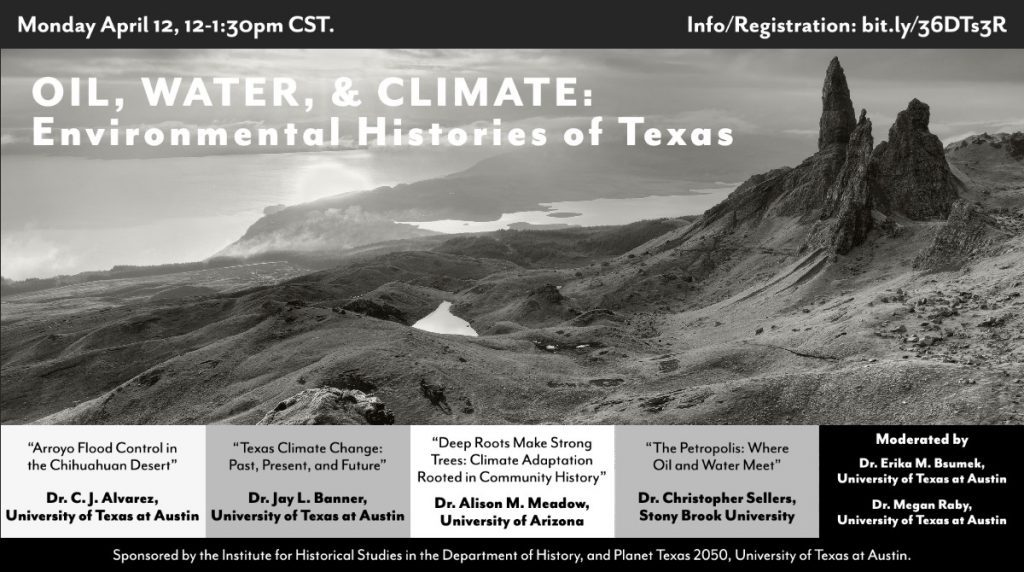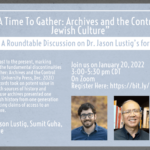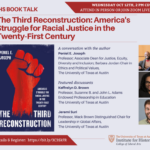Institute for Historical Studies, Monday April 12, 2021
Featured Panelists:
- “Arroyo Flood Control in the Chihuahuan Desert”
C. J. Alvarez
Assistant Professor, Department of Mexican American and Latino/a Studies
Faculty Affiliate, Department of History and Center for Mexican American Studies
University of Texas at Austin
Abstract: Deserts are, by definition, dry places. They are implicated in global climate change just as much as coastal regions, but instead of sea level rise and tropical storms, deserts are afflicted by widespread droughts well beyond the threshold of their natural aridness. In this talk, however, I will introduce you to an extremely local way of understanding water in the Chihuahuan desert, the largest desert in North America. Focusing on arroyo flood control projects, I aim to illuminate an important feature of desert people’s lives that is almost always overlooked or taken for
granted. This localized focus argues for a broader approach to the environmental history of deserts that focuses on desert dwellers instead of outsiders’ reactions or impressions of drylands.
- “Texas Climate Change: Past, Present, and Future”
Jay L. Banner
F. M. Bullard Professor of Geological Sciences, the Jackson School of Geosciences, and
Director, Environmental Science Institute.
University of Texas at Austin
Abstract: Texas’ climatological and geopolitical location has the potential to put extreme stress on its water and other resources. Paleoclimate records indicate that the region experienced periods of significant drought over the last thousand years. These droughts were longer than the 1950s ‘drought of record’ that is commonly used in planning and occurred independently of human-induced climate change. Model simulations for the 21st century project that Texas will experience droughts that are unprecedented in terms of length and intensity. A projected doubling of the state’s population by mid-century will drive increased demand for water, which will create synergistic challenges to the state’s resilience.
- “Deep Roots Make Strong Trees: Climate Adaptation Rooted in Community History”
Alison M. Meadow
Associate Research Professor, Arizona Institutes for Resilience
University of Arizona
Abstract: Communities throughout the Southwest are facing an uncertain future as climate change places our health, infrastructure, and natural environments at risk. This talk will focus on using community-based research approaches in order to ground climate change adaptation planning in the history and culture of communities so that long-term plans build on community strengths and priorities, even as we recognize the need for change to meet the challenge of our new climate reality.
- “The Petropolis: Where Oil and Water Meet”
Christopher C. Sellers
Professor of History, Stony Brook University, and
Research Fellow, Institute for Historical Studies, University of Texas at Austin
Abstract: If oil and water have a sturdy reputation for not mixing, Texas has long been a place where they unavoidably meet, especially in cities that arose on the back of the state’s oil industry, Petropolises. Taking the Houston metro area as an example, my talk will sketch out three eras from the late nineteenth century to the present in its historical relationship between water and oil. In the first two, while it also weathered occasional storms and floods, this like other cities associated with the petroleum and petrochemical industries increasingly took toxic pollution as its main waterborne challenge. More recently, the prevailing threat has come from hurricanes and floods, intensifying thanks to the global effects of its favored industry and placing the entire region in a new kind of jeopardy.
The views and opinions expressed in this article or video are those of the individual author(s) or presenter(s) and do not necessarily reflect the policy or views of the editors at Not Even Past, the UT Department of History, the University of Texas at Austin, or the UT System Board of Regents. Not Even Past is an online public history magazine rather than a peer-reviewed academic journal. While we make efforts to ensure that factual information in articles was obtained from reliable sources, Not Even Past is not responsible for any errors or omissions.




